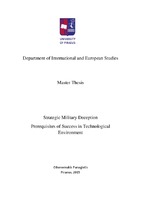| dc.description.abstractEN | This is a study of deception, mainly in warfare as well as in peacetime and its application in military environment in technological era. Deception is a newcomer issue in international literature, regarding international and military affairs, as concerns about role of deception in military have waxed and waned since the end of World War II yet in next pages we attempt to elaborate how it has been working in several situations throughout the years from both theoretical an empirical perspective and what the conditions for a successful deception operation are, especially in the era of advanced technology.
Concerning methodology, firstly, we do a brief historical flashback to mention the timelessness character of deception in military operations, from ancient times until today. Then, we make reference in theories of strategy and how deception is implicated to the strategic planning. Next, we make an introduction to a general theory of deception, terminology, its principles and forms, the deceptions process, as well as the factors that enhance the percentage of success in conflicts. In the final section of theory, we present the concept of countering deception and whether is feasible to detect a deception campaign and prolong a surprise attack and, also, we mention some basic current trends in technology, examining their application and role in military operations and, especially in deploying deception campaigns.
In the second part, we try to see how the theory is implemented in practice. We use two examples where military deception occurred: The Operation Barbarossa and the Yom Kippur War. In these case studies we try to understand how Germany and Arabs made extensive use of deception practices in order to achieve tactical surprise in battlefield and gain strategic advantages over their enemies. | el |



